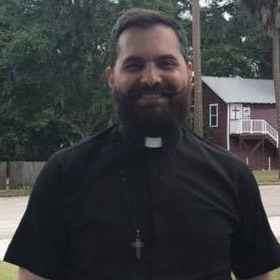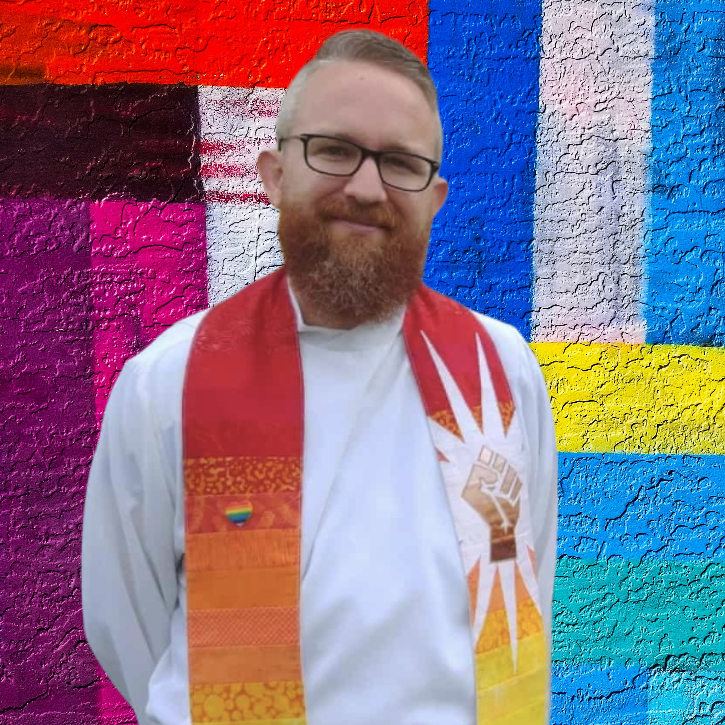
Follow Up: May Florida Food Forum
Sacred Nutrition: Religion and Food Justice
If you were unable to attend the meeting, the full presentation is available to watch online here.
To keep the conversation going, please visit our forum on Youth in the Food System here to add your thoughts and comments.
On Friday, May 28th, the Florida Food Forum on "Sacred Nutrition: Religion and Food Justice" featured The Reverend Gabriel Morgan, Pastor of St Paul Lutheran Church and Faith Lutheran Church in Tampa, and The Reverend Andy Oliver, Pastor of Allendale United Methodist in St. Petersburg.
“The relevance of our topic to food policy is centered on the cultural nexus, created by the collapse of sustainable local food systems and concurrently, the colonization of our entire culture by the industrial food system,” said host Dell deChant at the opening of the forum.
“While this is happening everywhere, the most destructive and tragic consequences are occurring in those communities that have already been harmed due to political, economic, educational, and creative marginalization. Food policy can make a real difference in these communities and it can make a difference right now…What better way to do so than to consider what is being done in those great centers of cultural inspiration as well as cultural critique—namely religious centers.”
The first to present on this important topic was Reverend Gabriel Morgan, who gave an introduction to the GIFT Center Garden and Faith Lutheran Church in Tampa, and spoke on policies of the Evangelical Lutheran Church in America on the use of property for food production, public policies favoring agrarian projects and strategies for evolving food support into food production in religious communities.
The GIFT Center Garden (Gardening in Faith Together), now known as the Seeds of Peace GIFT Center, is the community garden at Faith Lutheran Church. The currently garden has 20 beds with micro irrigation and the church has even implemented its own composting system.Produce grown in the garden is placed on the tables of the Kinship Free Markets, a grocery pantry designed around the concept of solidarity, and the remaining unused produce is composted for new gardening.
The garden has a number of community partners including First United Church of Tampa and USF Urban Food Sovereignty Group. Reverend Morgan explains that Food Sovereignty is one of the key concepts the garden is evolving into, by focusing production on the foods neighbors prefer to eat.
Reverend Morgan pointed to The FaithLands Movement, a burgeoning movement that many churches are following, as one reason for an increase in projects similar to the Seeds of Peace GIFT Center At the heart of the movement is the idea that religious communities have something to contribute to the larger movement around food justice and food production.
“The FaithLands Movement is really a movement across the country that sort of captures what we have gone through here in our context too,” notes Reverend Morgan.
Started by the Agrarian Trust, the FaithLands Movement is defined as “a growing national movement to connect and inspire faith communities to use their land in new ways that promote ecological and human health, support local food and farming, enact reparative justice, and strengthen communities.”
Some churches have joined this movement by starting gardens, leasing land to local farmers, or in some cases by donating property to agrarian trusts to protect it from development.
Reverend Morgan says that church gardens are becoming more common, but are still not the predominant paradigm for land use across the denomination. There is, however, a major program led by the Evangelical Lutheran Church in America known as ELCA World Hunger. This program makes connections between the climate crisis, food production and social justice.
One of the featured programs of the ELCA World Hunger program is the Global Farm Challenge whose goal is to “raise $500,000 to equip communities around the world and in the U.S. with livestock, seeds, tools, training and other agriculture-related activities to turn a hungry season into a hopeful season.”
Exploring Policies
One of the noteworthy programs Reverend Morgan noted was the Good Food Purchasing Program. It is part of the DART (Direct Action and Research Training) network, which is a national network with partners across several states that strives to “increase movement coordination with metric-driven standards, enhance capacity of local coalitions, activate policy, empower governments by sharing tools and possible targets, and leveraging buying power via increased supply chain knowledge.”
He also pointed to the Food Forward New York City plan as it is an example of how a city can sketch out a “Right to Food.” This food system plan has 5 overarching goals: “food access for all New Yorkers, worker protection, good jobs and economic opportunities; modern, efficient infrastructure and supply chains; sustainability from production to disposal; and education, communication and administrative support to implement the plan.”
For those who want to learn more or for religious leaders who want to continue this conversation with their congregation, Reverend Morgan suggested two resources: A Rocha’s guide to starting church gardens and FaithLand’s toolkit for starting church gardens.
The next speaker, Reverend Andy Oliver, began his presentation with a story about Allendale United Methodist and how it has changed over the past few years.
“I arrived at Allendale five and a half years ago to a church that was slotted to close,” said Reverend Oliver. “We had dwindled down from the height of 1968 to 700 people in church to having 40 in church. And it was becoming increasingly impossible to sustain the ministry here. And so we didn’t have any time to lose and we went for it.”
It was decided that the church would become “one that would be radically inclusive, one that would be centered in justice, one that would center the voices of the marginalized.” Which he notes was an important part to their work in food justice.
The church also opened up to provide free meeting space to anyone in the community who was doing the work of justice. This brought an immediate result—the once almost empty building was now full of over 1000 community members.
Allendale became of hub for social justice and naturally, food insecurity and food justice was on the minds of many.
Located within a quarter mile of 5 major grocery chains, Reverend Oliver notes that just a few miles south on the other side of the dividing line in South St. Petersburg, there are miles and miles without any grocery stores.
“As we started to look at the way to transformed our empty building into making a space for community, we also started to look at our land that was surrounding our building. And we were asking the same questions Reverend Morgan talked about. How can we use this land to do justice?”
After being approached by community member Ray Wunderlich about planting pine trees at the church, the idea of started a community garden became apparent. Since then, Reverend Oliver has worked together with Ray, church members and other community members to start and maintain a number of gardens in the surrounding area.
However, it has not been completely smooth sailing. Reverend Oliver noted that in the State of Florida, anyone can put up a garden on residential land, however this was not the case for churches. After neighbors in the area had complained to the city about the gardens, a year-long campaign to add an exception to the city’s land use plan to allow this for this essential service ensued. Eventually, the church won the right to garden and has since gained over 50 volunteers.
In fact, in the previous season, the gardens were able to produce an incredible 1600 pounds of food, including watermelon, winter melon, pumpkin, collards, kale, cilantro, beets and more.
Reverend Oliver says that these gardens have not only helped to fill a gap in making sure that community members can have more access to fresh fruits and vegetables, they have also continued to offer a way for the church community to be authentic to who they say they are; especially in upholding the values found in their welcoming address, “No matter your race, ethnicity, economic situation, sexual orientation, gender identity or expression, background or belief, age or condition of ableness, whether single or partnered, you are God’s beloved and you are welcome here.”
After the conclusion of the presentations, the speakers were asked a number of questions during the Q&A session on topics such as: how to pursue championing similar projects in one’s religious community, how to sustain labor requirements for such projects, how churches can partner with other churches and community organizations and more.
Resources
Learn about St Paul Lutheran Church and Faith Lutheran Church in Tampa
Learn about Allendale United Methodist in St. Petersburg.
Guest Presenter Information:
 Rev. Dr. Gabriel Morgan is the pastor of St Paul Lutheran Church and Faith Lutheran Church in Tampa, Florida. Faith Lutheran is home to an urban garden called Seeds of Peace: Gardening in Faith Together, a joint effort together with First United Church of Tampa. Gabriel is a proud USF alumnus of the philosophy and religious studies programs. He holds an MDiv from Union Theological Seminary in the City of New York with distinction in historical theology, and a PhD from the Lutheran Theological Seminary at Philadelphia, dissertation on Dietrich Bonhoeffer and Paul Ricoeur. He and his wife, Erin, live in Southeast Seminole Heights.
Rev. Dr. Gabriel Morgan is the pastor of St Paul Lutheran Church and Faith Lutheran Church in Tampa, Florida. Faith Lutheran is home to an urban garden called Seeds of Peace: Gardening in Faith Together, a joint effort together with First United Church of Tampa. Gabriel is a proud USF alumnus of the philosophy and religious studies programs. He holds an MDiv from Union Theological Seminary in the City of New York with distinction in historical theology, and a PhD from the Lutheran Theological Seminary at Philadelphia, dissertation on Dietrich Bonhoeffer and Paul Ricoeur. He and his wife, Erin, live in Southeast Seminole Heights.
 Rev. Andy Oliver (he/him/his) is pastor of Allendale United Methodist in St. Petersburg, Florida, a church that is committed to anti-racism and radical solidarity with folx on the margins. He is grounded in liberation theology and following Jesus, a community organizer who always located himself with the oppressed, helping them to use their power to dismantle evil. He is currently president of Methodist Federation for Social Action, a national justice-seeking organization, and was senior staff at Reconciling Ministries Network, a national LGBTQ justice non-profit. Andy is a graduate of the University of Florida and Duke Divinity School. He previously served congregations in Lakeland, Ft. Lauderdale, and outside Gainesville. He loves spending time with his two boys building Legos and seeing the world through their eyes.
Rev. Andy Oliver (he/him/his) is pastor of Allendale United Methodist in St. Petersburg, Florida, a church that is committed to anti-racism and radical solidarity with folx on the margins. He is grounded in liberation theology and following Jesus, a community organizer who always located himself with the oppressed, helping them to use their power to dismantle evil. He is currently president of Methodist Federation for Social Action, a national justice-seeking organization, and was senior staff at Reconciling Ministries Network, a national LGBTQ justice non-profit. Andy is a graduate of the University of Florida and Duke Divinity School. He previously served congregations in Lakeland, Ft. Lauderdale, and outside Gainesville. He loves spending time with his two boys building Legos and seeing the world through their eyes.
Forum Host: Dell deChant is the Associate Chair of the Religious Studies Department at the University of South Florida and a member of the Board of Directors at the Florida Food Policy Council.
Thank you to our sponsors for making this forum possible:
 FHEED provides food systems planning, GIS analysis, advocacy, and education about food systems and healthy communities.
FHEED provides food systems planning, GIS analysis, advocacy, and education about food systems and healthy communities.
Contact: Anthony Olivieri, Founder, FHEED LLC
Website: www.FHEED.com
 J Haskins Law, located in Tampa, empowers communities with the legal and risk management tools they need to exercise food sovereignty. The contact for J Haskins Law is Jesse Haskins.
J Haskins Law, located in Tampa, empowers communities with the legal and risk management tools they need to exercise food sovereignty. The contact for J Haskins Law is Jesse Haskins.
Contact: Jesse Haskins, Founder, J Haskins Law
Website: www.jhaskinslaw.com
The Florida Food Forum is a free event. To support our work, please consider becoming a member or making a donation. For questions or more information, contact us at: info@flfpc.org
Disclaimer: The views of the presenters do not represent the views of the Florida Food Policy Council. We are a forum for the offering and sharing of information and encourage diversity and communication within the food system.